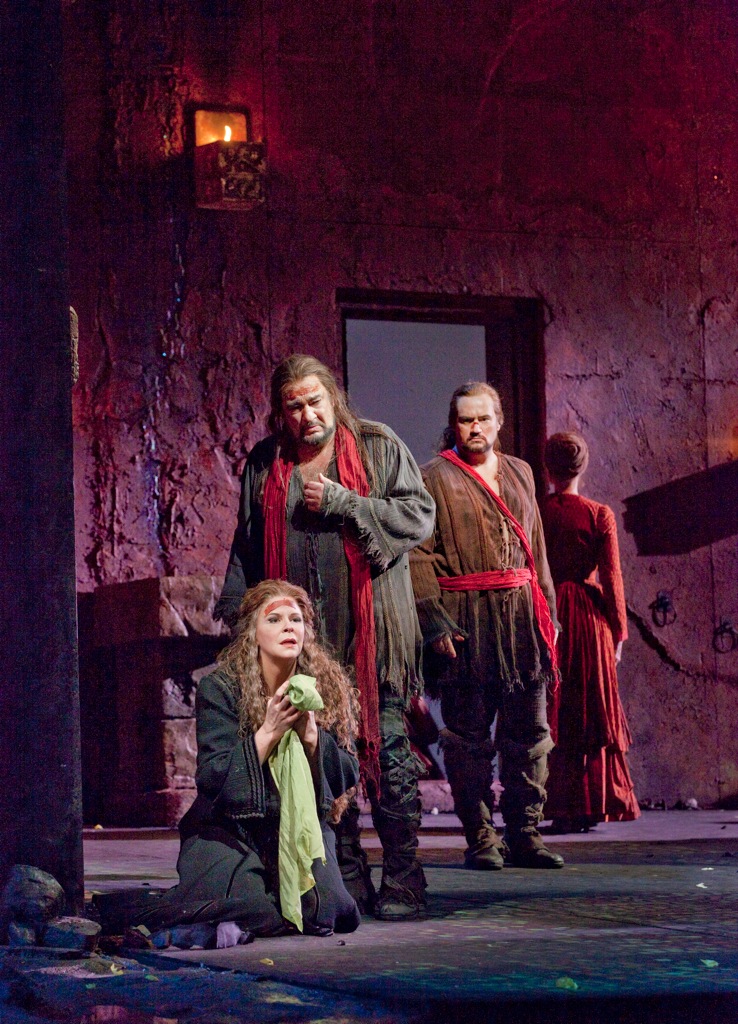With inspired cast, Met’s “Iphigénie” still a powerful experience, the dancing apart

Susan Graham, Placido Domingo and Paul Groves in the Metropolitan Opera's "Iphigénie en Tauride." Photo: Ken Howard.
It may seem odd to praise an opera for its moments of silence. But Saturday’s revival of Gluck’s Iphigénie en Tauride at the Met was a powerful illustration of the fact that it is silence that adds depth to music, like shadows to a painting. When the curtain goes up there is an awful silence, pierced by Iphigenie’s anguished cry, as she is forced to perform a human sacrifice. There are numb silences as she sits between Oreste and Pylades, the two men she is told to kill, one of whom she may choose to be spared. And there is the desperate pause before she lunges at the altar to sacrifice Oreste only to find that her hand will not obey.
It takes guts to pull off such silences, as well as a cast of charismatic singers. The Met is fortunate to have been able to reunite the three principals who created Stephen Wadsworth’s production in 2007: Susan Graham as the tormented priestess Iphigénie, Plácido Domingo as Oreste, her guilt-racked matricidal brother, and tenor Paul Groves as Pylades, the loyal friend ready to sacrifice his life for Oreste.
Tall and regal, Graham commands the stage in each scene. Her voice appears alive with an electric current that pulsates in every note. Even at a very brisk tempo, her lament, O malheureuse Iphigénie, was charged with emotion, though her low notes did not always match the vibrant colors of her high register. In her acting she combines intensity of expression with an economy of gesture that seemed very much in keeping with an aristocratic character held captive not only by a foreign king but also by memories of her family’s bloody history. When she does explode into movement, taking that running lunge at Oreste, for instance, or struggling against his attempts to embrace her in the final scene, it is like the sudden release of a tightly coiled spring.
Domingo’s Oreste finds few opportunities for any such release, not least of all because he is almost always in chains. His voice has lost some of its polish with age, but its emotional and dramatic core remains powerfully intact. His runs in O Dieux qui me poursuivez came out uneven, though that may have something to do with the sets by Thomas Lynch which compartmentalize the stage into unequally resonating boxes. But by the final act, when he recognizes Iphigénie as his sister, it was as if the chains had fallen off his voice, too, revealing a glorious, burnished sound.
With Oreste sung by Domingo (the role was initially conceived for baritone) the duets with his friend and brother-in-arms Pylades lose some of their dynamic variety, but Groves’s incisive, somewhat metallic, tenor managed to stand out. He brought exquisite phrasing to his moving aria Unis dès la plus tendre enfance.
There were few revelations among the supporting roles, many of whom made their house debuts. King Thoas was sung by Gordon Hawkins with a beefy baritone; Lei Xu and Cecilia Hall made somewhat flimsy priestesses. Julie Boulianne was a radiant Diane, descending undaunted from the flies. Patrick Summers presided over a slightly restrained performance by the Met orchestra.
The only truly distracting element of an otherwise gripping production were the dances choreographed by Daniel Pelzig with puzzling eclecticism. One moment he has the ballet of priestesses slapping their bellies in gestures loudly reminiscent of Pina Bausch’s Rite of Spring, the next he has soldiers linking arms for a round of Balkan folk dances. Even worse are the male dancers cavorting atop the sacrificial altar that holds so much evident terror for the protagonists, and has served as a landing pad for the Goddess of the Hunt herself. In an opera in which dance, recitative and aria are so organically interwoven, it would have been nice if the choreography, too, plumbed the depths of the tragedy’s shadows and silences.
Iphigénie en Tauride will be performed at the Metropolitan Opera on February 21 and 26 and March 2 and 5. metopera.org; 212-362 6000